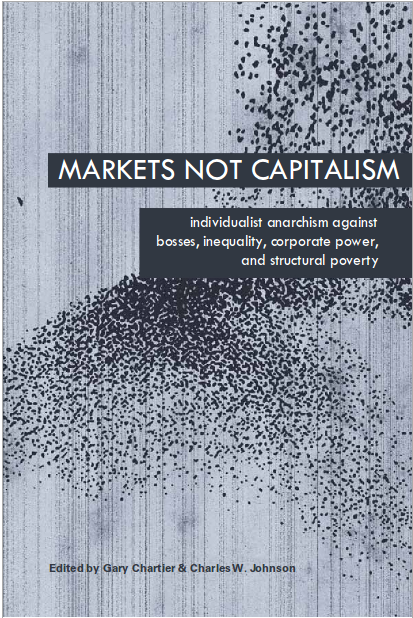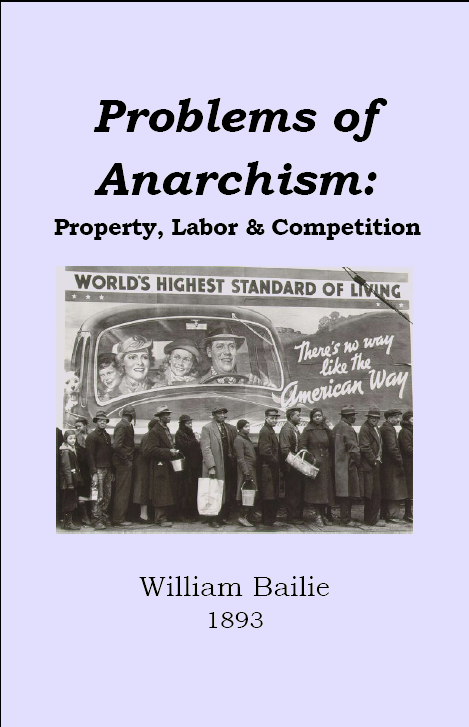tl;dr. Two beautiful new booklets are available for ordering to-day from the ALL Distro — this month’s Market Anarchy, with an article on truly public property — public property, that is, without state control — and this month’s Anarchist Classic, with a Spencerian-Mutualist take on the Economics of Anarchy, by the insurrectionary mutualist Dyer D. Lum. You can get one free sample copy of either series (or both) to check out, if you’re considering a monthly subscription for individual copies or monthly packs to distribute in the radical space of your choice. Sound good? Contact me for details.
Scatter tracts, like raindrops, over the land….
–William Lloyd Garrison, The Liberator, March 1831.
To-day, I am happy to announce this month’s two additions to the Alliance of the Libertarian Left Artwork & Agitprop Distro. They debuted on Saturday at this year’s Los Angeles Anarchist Bookfair, and now, gentle reader, they come to you. Issue #20 (June 2011) of the monthly Market Anarchy Zine Series is a formulation by Roderick Long, on the right to public property in a stateless society. Issue #8 of the Anarchist Classics Zine Series is an edition of Dyer D. Lum’s The Economics of Anarchy, a fascinating Spencerian-Mutualist account of ownership and labor in a free society.
Here we are:
|
|
An individualist anarchist analysis and defense of rights to public property — not property that belongs to government, but property that belongs to the public — you and me and our neighbors.
Libertarians often assume that a free society will be one in which all (or nearly all) property is private…. To most people, !!!@@e2;20ac;2dc;public property' means !!!@@e2;20ac;2dc;government property.' As an anarchist, I do not advocate government property of any sort. But this is not the only kind of public property. Throughout history, legal doctrine has recognized, alongside property owned by the the public as organized into a state and represented by government officials, an additional category of property owned by the unorganized public. This was property that the public at large was deemed to have a right of access to, but without any presumption that government would be involved in the matter at all. It is public property in this sense that I am defending….
It is true that private property provides a protected sphere of free decision-making – for the property's owners. But what is the position of those who are not property owners? A system of exclusively private property certainly does not guarantee them !!!@@e2;20ac;2dc;a place to stand.' Far from providing a sphere of independence, a society in which all property is private thus renders the propertyless completely dependent on those who own property…. It is true that users of public property face a somewhat greater risk from their fellow users than users of private property do. By the same token, however, public property allows more freedom. That is why the best option is a society that makes room for both public and private property. Those who place a high value on security, and are willing to put up with burdensome restrictions in order to get it, will be free to patronize private property, while those who seek self-expression, are averse to restrictions, and are willing to put up with more risk from others will likewise be free to patronize public property….
$1.25 for 1; 75¢/ea in bulk.
|
|
|
I have repeatedly been asked to write a brief summary of the aims sought by Anarchists which could be read and discussed in the various clubs that are studying economic questions. With this end in view the following pages are submitted, trusting that they may be a help to those who are earnestly seeking the rationale of the Labor Question….
FREE EXCHANGE … would break the monopoly now possessed by currency, the instrument of exchange, and also could open full use of the possession of land…. Has the workman equal freedom to compete with the employer of labor? … But why not? Because behind the capitalist, as we now find him, privilege lends support which transforms the result of honest industry into a hideous Moloch standing with outstretched arms to receive as sacrificial victims the toilers who have made that capital possible…. Capital itself is man's best friend, the true social savior that opens the march of progress and that has transformed society from warlike to peaceful pursuits. But under the crucifying hands of legalization, where prerogative mocks at penury, its mission is thwarted and it becomes a ravenous beast…. Reliance upon militant measures, trying to curb indus trial discontent by legislative coercion, is reactionary in character. However disguised in twilight mixtures it is the spirit of the old regime seeking to dominate the new; as vain as seeking to check an exhaustless flow of water by damming the stream. The remedy cannot lie in enactments, in the organization of systems, in return to simplicity of structure, for industrial civilization demands plasticity of forms … while organization, on the other hand, ever tends to rigidity….
Dyer Lum was among the most labor-oriented of the American mutualists, working actively as a labor organizer and maintaining close working ties with August Spies, Albert Parsons, and many of the other Chicago Communists — he actually took over publishing The Alarm after Parsons and the other Haymarket martyrs were hanged. Unlike Tucker, who officially rejected any concern with questions of ownership and employment, so long as workers were fully freed from monopolistic constraints on their bargaining power, Lum’s book is a defense of mutual enterprise and worker ownership. But he also explicitly rejects communism and defends private property and free exchange — which Lum approaches with a fascinating appropriation of Herbert Spencer’s distinction between the militant type and the industrial type of society, characterized respectively by violence, domination and rigidity, on the one hand; and peace, productivity, equality and plasticity on the other.[] Lum is also notable as an insurrectionist — a sort of bomb throwing revolutionary Mutualist. There’s a common, and really grossly mistaken, stereotype that the Collectivist and Communist Anarchists in America were the revolutionaries, and the Individualists and the Mutualists were Philosophical Anarchists who had no immediate plan to overthrow government, and for the time being counseled only education and moral agitation.[] But this is wrong, as a general thing,[] and Lum in particular is a huge, obvious counterexample — a defender of revolutionary politics and of the Chicago martyrs, who smuggled the dynmite caps to the imprisoned Louis Lingg. In Economics the issue appears mostly in the background — with the occasional adversions to, e.g., the relationship between Garrison’s agitation and Brown’s insurrection — but it is approached directly in an extended discussion in the final chapter, a Digression on Methods.
$2.00 for 1; $1.50/ea in bulk.
|
As I’ve mentioned in past months, both the Market Anarchy Zine Series and the new Anarchist Classics Zine Series have become regular monthly publications. One issue in each series is published every month. New issues are normally announced during the first week of each month, and mailed out during the third week of the month. (This month, as you can see, the announcement has been deferred in order to focus on preparing the new issues, and other wares, for the Los Angeles Anarchist Bookfair. But we should be returning to our regular schedule in July.) You can order individual copies online or contact me to sign up for a regular subscription, either for personal reading or bulk orders for distributing, tabling, or stocking local infoshops and other radical spaces. If you’re considering subscribing, you can contact me to request a free sample copy for you to check out, compliments of the Distro; then, if you like it, continue the subscription for the rest of the year at the following rates:
| Market Anarchy Zine Series |
|
Individuals |
Bulk Distribution Packets |
$1.50/issue
(= $18/year) |
No. of copies !!!@@e2;153;2022; 80¢/issue
(= N !!!@@e2;153;2022; $9.60/year) |
| Anarchist Classics Zine Series |
|
Individuals |
Bulk Distribution Packets |
$2.25/issue
(= $27/year) |
No. of copies !!!@@e2;153;2022; $1.25/issue
(= N !!!@@e2;153;2022; $15/year) |
For details on all your options (including ready-to-print electronic versions, customization with local contact information, and discounts for quarterly shipments), see Market Anarchy Mailed Monthly.
Prices include shipping & handling costs. If you decide not to continue the subscription, the sample issue is yours to keep. Intrigued? Contact me forthwith and we’ll get something worked out.
That’s all for now. Next month, you can look forward to some free-market environmentalism and the long-lost problems of an individualist. Until then–read and enjoy!
See also:
 Tabling in the exhibition area for Markets Not Capitalism, the ALL Distro, and Center for a Stateless Society. We’ll have copies of the book, booklets, pamphlets, buttons, and more; and we’ll be there to talk to convention-goers about free-market anticapitalism and left-libertarian ideas. I’m going to enjoy the talks but in all honesty the person-to-person contact and the tabling is the kind of groundwork that I see as by far the most important stuff, and which I’m most looking forward to doing.
Tabling in the exhibition area for Markets Not Capitalism, the ALL Distro, and Center for a Stateless Society. We’ll have copies of the book, booklets, pamphlets, buttons, and more; and we’ll be there to talk to convention-goers about free-market anticapitalism and left-libertarian ideas. I’m going to enjoy the talks but in all honesty the person-to-person contact and the tabling is the kind of groundwork that I see as by far the most important stuff, and which I’m most looking forward to doing.




